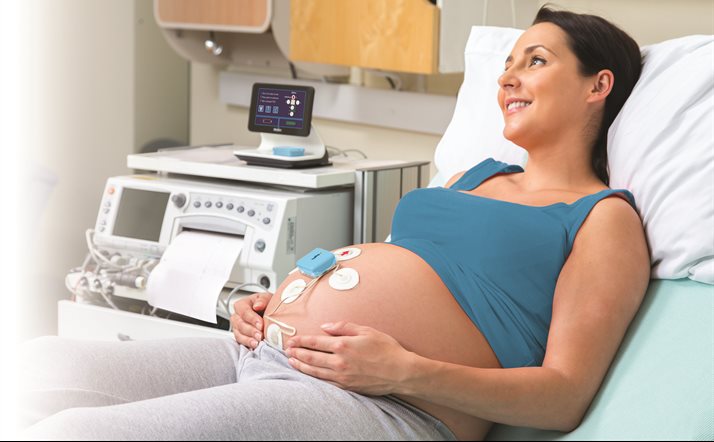Fetal Monitoring - spinout Monica Healthcare acquired by GE Healthcare

The Centre for Healthcare Technologies has experience of developing technologies across the full journey from scientific discovery to clinical adoption. This is illustrated by the success of spin-out company Monica Healthcare, which was acquired by GE Healthcare.
Spin-out success
University of Nottingham spin-out company, Monica Healthcare, which developed a novel technology for monitoring expectant mothers, was acquired by GE Healthcare in 2017. Monica Healthcare was spun-out of the University to develop work from the research group that was led by Professor Barrie Hayes-Gill and his colleague Professor John Crowe between 1989 and 2002.
Fetal monitoring
Monica Healthcare’s technology enhances obstetric care by the use of wireless fetal monitoring devices, enabling an expectant mother to move freely during labour to more comfortable positions, even to be able to take a shower.
Monica’s advanced fetal monitors are already used by midwives, labour and delivery nurses, and expectant mothers at over 1000 sites across Europe, Asia and North America, with more than 100,000 patients benefitting from the technology in 2017.
The company, which employed 20 people in Nottingham at the time of the sale, was established by Professor Hayes-Gill with two of his researchers Dr Barratt, CEO of the company, and Dr Pieri, Monica’s CTO. Professor Hayes-Gill worked part-time as Director of Research for Monica Healthcare Ltd since its creation in 2005 as part of the management team and as an Executive Director on the board.
Wireless Patch
Since 2015, GE Healthcare has been Monica’s exclusive North American distribution partner for the Novii Wireless Patch System – a single-patient use patch that effectively monitors maternal heart rate, fetal heart rate, and uterine activity, even on the patients who are difficult to monitor using the existing ultrasound technology. The Novii patch communicates through Bluetooth wirelessly to the fetal monitor, providing patients with greater mobility in labour.
Professor Barrie Hayes-Gill commented:
Joining GE Healthcare provides a fantastic opportunity to bring together Monica’s digital offerings with GE Healthcare’s global infrastructure to provide even stronger capabilities and solutions to customers around the world.
GE is one of the world’s leading healthcare solutions companies, and will be promoting the use of Monica’s technology internationally. The funders, researchers, and the range of other supporters should all feel very proud of what they have achieved by working together and believing in Monica Healthcare.
Improving maternal and infant care
Tammy Noll, General Manager of GE Healthcare’s Maternal-Infant Care division, added:
At GE Healthcare, we are committed to improving the health care experience across care areas, including childbirth. Through this acquisition, we will combine the incredible expertise and mobile-digital innovation from the Monica team with GE’s longstanding industry leadership and customer focus – all with the goal of bettering maternal and infant care for patients worldwide.”
At the time of the acquisition, GE Healthcare had a turnover of $14.85 billion and employed over 46,000 staff worldwide. The company’s Maternal Infant Care products include maternal/fetal monitors, infant warmers, infant resuscitation systems, phototherapy, incubators and combination beds, providing care for both mother and baby through delivery and post-delivery care. It is also one of the major providers of prenatal ultrasound systems.
A significant impact
Dr Susan Huxtable, Director of Intellectual Property Commercialisation at the University of Nottingham, said:
I am delighted that Monica is being acquired by GE Healthcare. GE will ensure that Monica Healthcare’s innovative products, based on technology developed by the University of Nottingham, can be distributed widely, benefitting thousands of expectant mothers across the world.
The success of Monica illustrates that although the journey to commercialisation might be a long one, in the end it can lead to something very worthwhile which can make a significant impact.”
Monica was funded in its early stages by Action Medical Research, the Engineering and Physical Sciences Research Council (EPSRC), EU (Maria Sklodowska-Curie) and Innovate UK.
Related information
Read more about our sensing capabilities
SurePulse newborn baby monitoring - a case study
Focus on Professor Barrie Hayes-Gill